Analysis of Ethical and Professional Guidelines in Direct Work
VerifiedAdded on 2022/09/18
|6
|1538
|23
Essay
AI Summary
This essay delves into the critical ethical and professional guidelines necessary for effective direct work, specifically within the context of case management involving minority client groups. The essay emphasizes the significance of cultural competency, respect for diversity, and the promotion of social justice in interactions with vulnerable populations such as the elderly, disabled, Aboriginal communities, refugees, and asylum seekers. It highlights the importance of ethical frameworks and cultural communication in case management, drawing on examples within the Australian context. The essay discusses the importance of cross-cultural competency, cultural humility, and the need for case management teams to actively engage with minority communities. It also touches upon the importance of self-determination, individual dignity, and the recognition of cultural strengths to establish strong emotional contracts and facilitate effective service delivery. The essay references various studies and ethical codes to underscore the importance of ethical frameworks, cultural diversity, and the overall well-being of the clients.
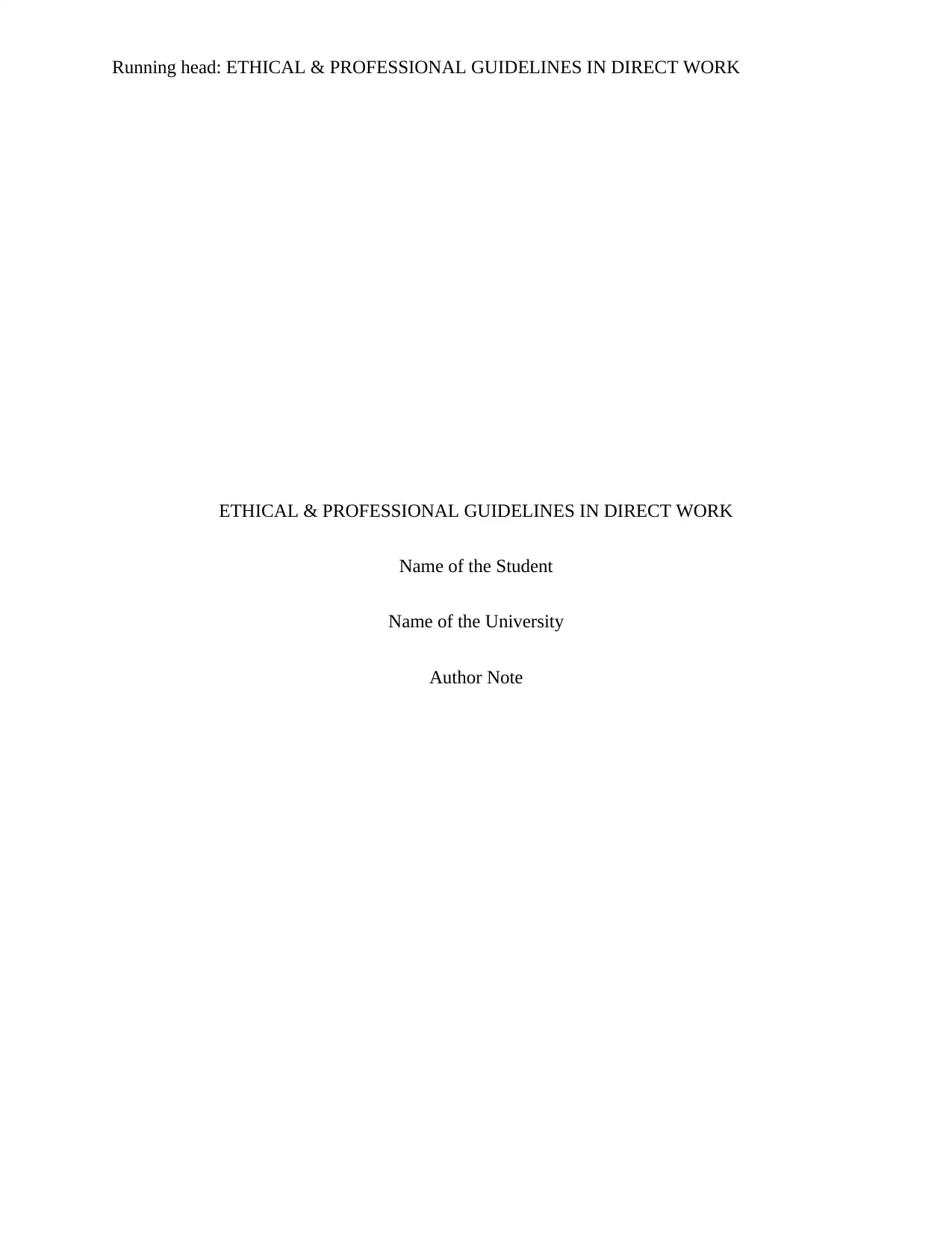
Running head: ETHICAL & PROFESSIONAL GUIDELINES IN DIRECT WORK
ETHICAL & PROFESSIONAL GUIDELINES IN DIRECT WORK
Name of the Student
Name of the University
Author Note
ETHICAL & PROFESSIONAL GUIDELINES IN DIRECT WORK
Name of the Student
Name of the University
Author Note
Paraphrase This Document
Need a fresh take? Get an instant paraphrase of this document with our AI Paraphraser
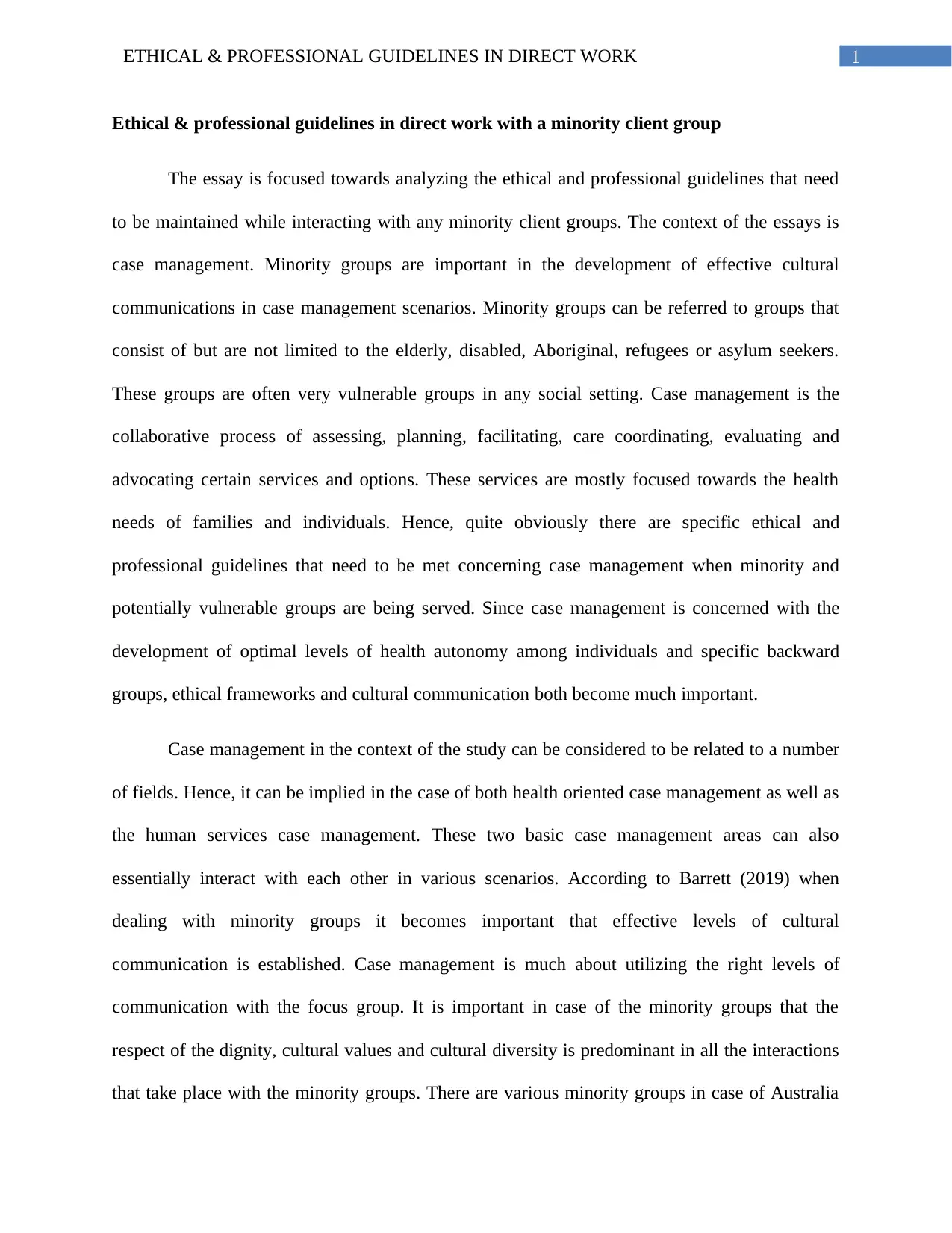
1ETHICAL & PROFESSIONAL GUIDELINES IN DIRECT WORK
Ethical & professional guidelines in direct work with a minority client group
The essay is focused towards analyzing the ethical and professional guidelines that need
to be maintained while interacting with any minority client groups. The context of the essays is
case management. Minority groups are important in the development of effective cultural
communications in case management scenarios. Minority groups can be referred to groups that
consist of but are not limited to the elderly, disabled, Aboriginal, refugees or asylum seekers.
These groups are often very vulnerable groups in any social setting. Case management is the
collaborative process of assessing, planning, facilitating, care coordinating, evaluating and
advocating certain services and options. These services are mostly focused towards the health
needs of families and individuals. Hence, quite obviously there are specific ethical and
professional guidelines that need to be met concerning case management when minority and
potentially vulnerable groups are being served. Since case management is concerned with the
development of optimal levels of health autonomy among individuals and specific backward
groups, ethical frameworks and cultural communication both become much important.
Case management in the context of the study can be considered to be related to a number
of fields. Hence, it can be implied in the case of both health oriented case management as well as
the human services case management. These two basic case management areas can also
essentially interact with each other in various scenarios. According to Barrett (2019) when
dealing with minority groups it becomes important that effective levels of cultural
communication is established. Case management is much about utilizing the right levels of
communication with the focus group. It is important in case of the minority groups that the
respect of the dignity, cultural values and cultural diversity is predominant in all the interactions
that take place with the minority groups. There are various minority groups in case of Australia
Ethical & professional guidelines in direct work with a minority client group
The essay is focused towards analyzing the ethical and professional guidelines that need
to be maintained while interacting with any minority client groups. The context of the essays is
case management. Minority groups are important in the development of effective cultural
communications in case management scenarios. Minority groups can be referred to groups that
consist of but are not limited to the elderly, disabled, Aboriginal, refugees or asylum seekers.
These groups are often very vulnerable groups in any social setting. Case management is the
collaborative process of assessing, planning, facilitating, care coordinating, evaluating and
advocating certain services and options. These services are mostly focused towards the health
needs of families and individuals. Hence, quite obviously there are specific ethical and
professional guidelines that need to be met concerning case management when minority and
potentially vulnerable groups are being served. Since case management is concerned with the
development of optimal levels of health autonomy among individuals and specific backward
groups, ethical frameworks and cultural communication both become much important.
Case management in the context of the study can be considered to be related to a number
of fields. Hence, it can be implied in the case of both health oriented case management as well as
the human services case management. These two basic case management areas can also
essentially interact with each other in various scenarios. According to Barrett (2019) when
dealing with minority groups it becomes important that effective levels of cultural
communication is established. Case management is much about utilizing the right levels of
communication with the focus group. It is important in case of the minority groups that the
respect of the dignity, cultural values and cultural diversity is predominant in all the interactions
that take place with the minority groups. There are various minority groups in case of Australia
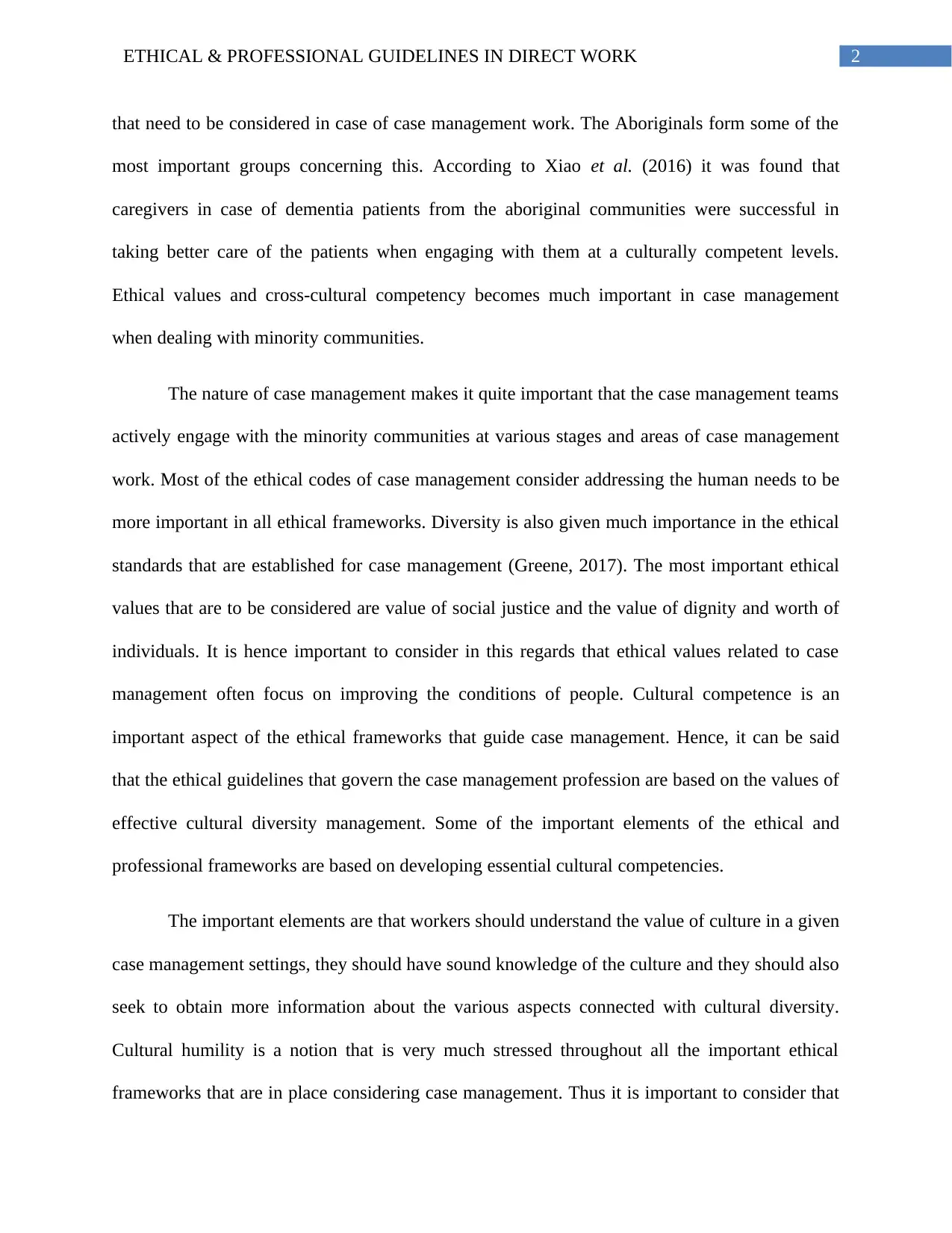
2ETHICAL & PROFESSIONAL GUIDELINES IN DIRECT WORK
that need to be considered in case of case management work. The Aboriginals form some of the
most important groups concerning this. According to Xiao et al. (2016) it was found that
caregivers in case of dementia patients from the aboriginal communities were successful in
taking better care of the patients when engaging with them at a culturally competent levels.
Ethical values and cross-cultural competency becomes much important in case management
when dealing with minority communities.
The nature of case management makes it quite important that the case management teams
actively engage with the minority communities at various stages and areas of case management
work. Most of the ethical codes of case management consider addressing the human needs to be
more important in all ethical frameworks. Diversity is also given much importance in the ethical
standards that are established for case management (Greene, 2017). The most important ethical
values that are to be considered are value of social justice and the value of dignity and worth of
individuals. It is hence important to consider in this regards that ethical values related to case
management often focus on improving the conditions of people. Cultural competence is an
important aspect of the ethical frameworks that guide case management. Hence, it can be said
that the ethical guidelines that govern the case management profession are based on the values of
effective cultural diversity management. Some of the important elements of the ethical and
professional frameworks are based on developing essential cultural competencies.
The important elements are that workers should understand the value of culture in a given
case management settings, they should have sound knowledge of the culture and they should also
seek to obtain more information about the various aspects connected with cultural diversity.
Cultural humility is a notion that is very much stressed throughout all the important ethical
frameworks that are in place considering case management. Thus it is important to consider that
that need to be considered in case of case management work. The Aboriginals form some of the
most important groups concerning this. According to Xiao et al. (2016) it was found that
caregivers in case of dementia patients from the aboriginal communities were successful in
taking better care of the patients when engaging with them at a culturally competent levels.
Ethical values and cross-cultural competency becomes much important in case management
when dealing with minority communities.
The nature of case management makes it quite important that the case management teams
actively engage with the minority communities at various stages and areas of case management
work. Most of the ethical codes of case management consider addressing the human needs to be
more important in all ethical frameworks. Diversity is also given much importance in the ethical
standards that are established for case management (Greene, 2017). The most important ethical
values that are to be considered are value of social justice and the value of dignity and worth of
individuals. It is hence important to consider in this regards that ethical values related to case
management often focus on improving the conditions of people. Cultural competence is an
important aspect of the ethical frameworks that guide case management. Hence, it can be said
that the ethical guidelines that govern the case management profession are based on the values of
effective cultural diversity management. Some of the important elements of the ethical and
professional frameworks are based on developing essential cultural competencies.
The important elements are that workers should understand the value of culture in a given
case management settings, they should have sound knowledge of the culture and they should also
seek to obtain more information about the various aspects connected with cultural diversity.
Cultural humility is a notion that is very much stressed throughout all the important ethical
frameworks that are in place considering case management. Thus it is important to consider that
⊘ This is a preview!⊘
Do you want full access?
Subscribe today to unlock all pages.

Trusted by 1+ million students worldwide
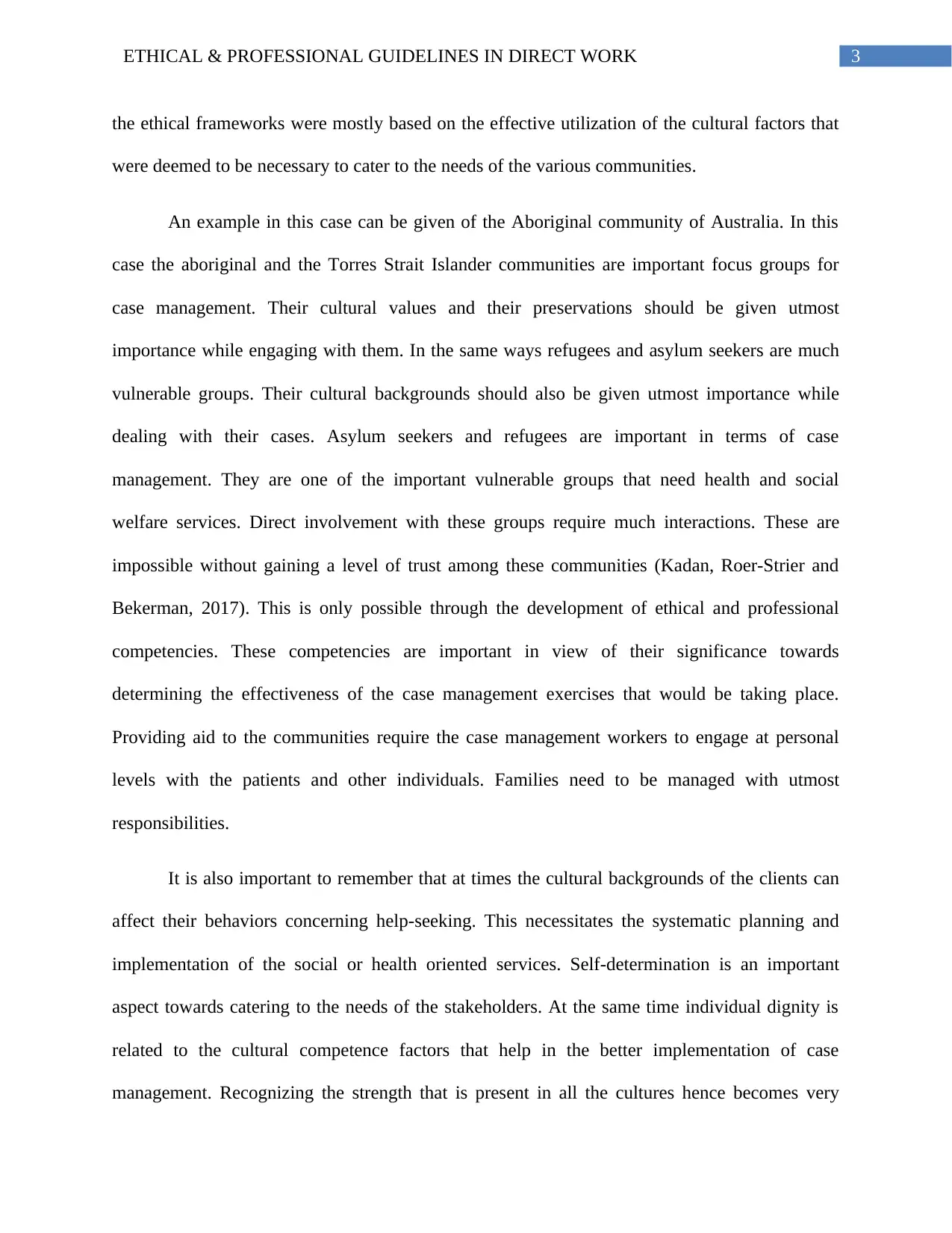
3ETHICAL & PROFESSIONAL GUIDELINES IN DIRECT WORK
the ethical frameworks were mostly based on the effective utilization of the cultural factors that
were deemed to be necessary to cater to the needs of the various communities.
An example in this case can be given of the Aboriginal community of Australia. In this
case the aboriginal and the Torres Strait Islander communities are important focus groups for
case management. Their cultural values and their preservations should be given utmost
importance while engaging with them. In the same ways refugees and asylum seekers are much
vulnerable groups. Their cultural backgrounds should also be given utmost importance while
dealing with their cases. Asylum seekers and refugees are important in terms of case
management. They are one of the important vulnerable groups that need health and social
welfare services. Direct involvement with these groups require much interactions. These are
impossible without gaining a level of trust among these communities (Kadan, Roer-Strier and
Bekerman, 2017). This is only possible through the development of ethical and professional
competencies. These competencies are important in view of their significance towards
determining the effectiveness of the case management exercises that would be taking place.
Providing aid to the communities require the case management workers to engage at personal
levels with the patients and other individuals. Families need to be managed with utmost
responsibilities.
It is also important to remember that at times the cultural backgrounds of the clients can
affect their behaviors concerning help-seeking. This necessitates the systematic planning and
implementation of the social or health oriented services. Self-determination is an important
aspect towards catering to the needs of the stakeholders. At the same time individual dignity is
related to the cultural competence factors that help in the better implementation of case
management. Recognizing the strength that is present in all the cultures hence becomes very
the ethical frameworks were mostly based on the effective utilization of the cultural factors that
were deemed to be necessary to cater to the needs of the various communities.
An example in this case can be given of the Aboriginal community of Australia. In this
case the aboriginal and the Torres Strait Islander communities are important focus groups for
case management. Their cultural values and their preservations should be given utmost
importance while engaging with them. In the same ways refugees and asylum seekers are much
vulnerable groups. Their cultural backgrounds should also be given utmost importance while
dealing with their cases. Asylum seekers and refugees are important in terms of case
management. They are one of the important vulnerable groups that need health and social
welfare services. Direct involvement with these groups require much interactions. These are
impossible without gaining a level of trust among these communities (Kadan, Roer-Strier and
Bekerman, 2017). This is only possible through the development of ethical and professional
competencies. These competencies are important in view of their significance towards
determining the effectiveness of the case management exercises that would be taking place.
Providing aid to the communities require the case management workers to engage at personal
levels with the patients and other individuals. Families need to be managed with utmost
responsibilities.
It is also important to remember that at times the cultural backgrounds of the clients can
affect their behaviors concerning help-seeking. This necessitates the systematic planning and
implementation of the social or health oriented services. Self-determination is an important
aspect towards catering to the needs of the stakeholders. At the same time individual dignity is
related to the cultural competence factors that help in the better implementation of case
management. Recognizing the strength that is present in all the cultures hence becomes very
Paraphrase This Document
Need a fresh take? Get an instant paraphrase of this document with our AI Paraphraser
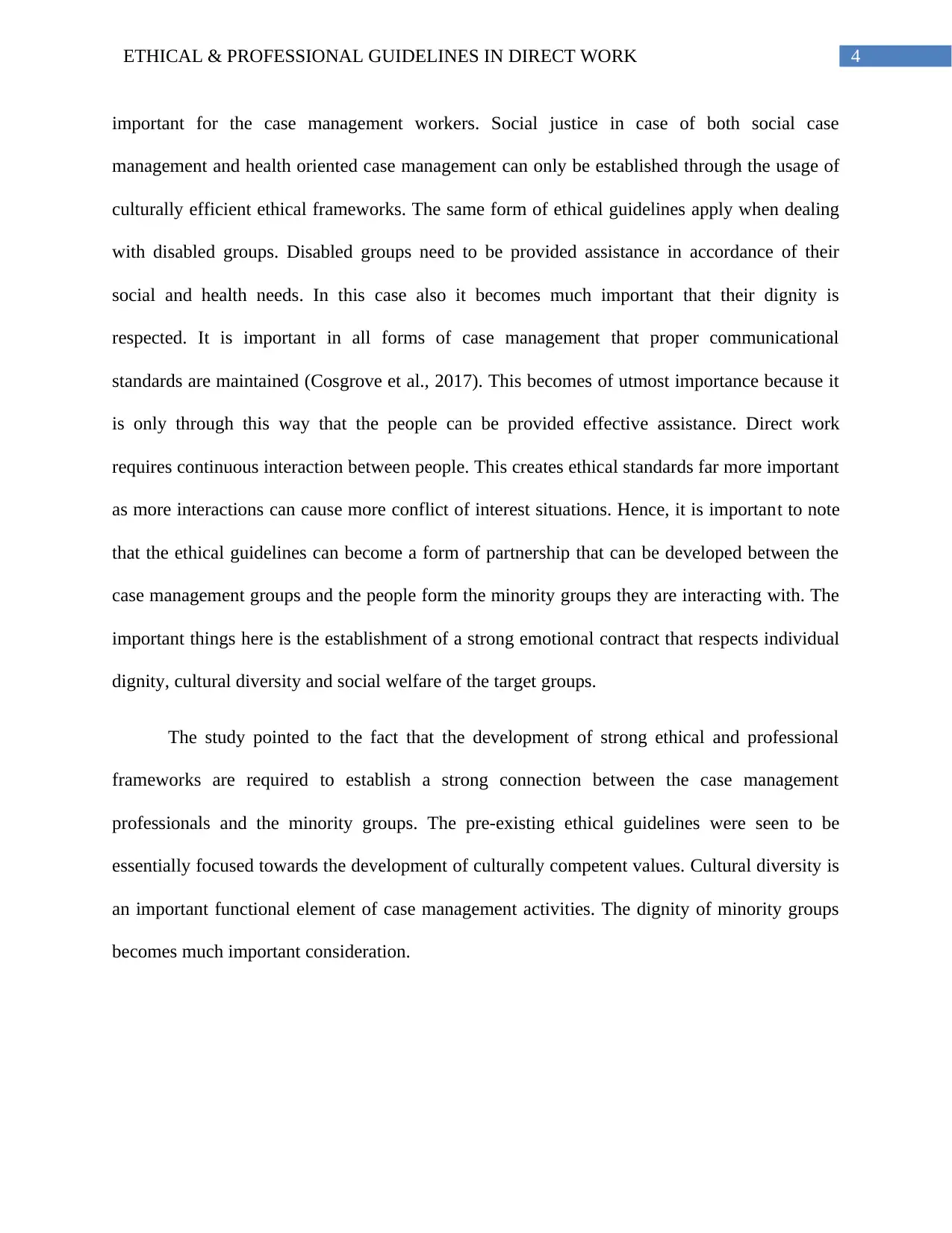
4ETHICAL & PROFESSIONAL GUIDELINES IN DIRECT WORK
important for the case management workers. Social justice in case of both social case
management and health oriented case management can only be established through the usage of
culturally efficient ethical frameworks. The same form of ethical guidelines apply when dealing
with disabled groups. Disabled groups need to be provided assistance in accordance of their
social and health needs. In this case also it becomes much important that their dignity is
respected. It is important in all forms of case management that proper communicational
standards are maintained (Cosgrove et al., 2017). This becomes of utmost importance because it
is only through this way that the people can be provided effective assistance. Direct work
requires continuous interaction between people. This creates ethical standards far more important
as more interactions can cause more conflict of interest situations. Hence, it is important to note
that the ethical guidelines can become a form of partnership that can be developed between the
case management groups and the people form the minority groups they are interacting with. The
important things here is the establishment of a strong emotional contract that respects individual
dignity, cultural diversity and social welfare of the target groups.
The study pointed to the fact that the development of strong ethical and professional
frameworks are required to establish a strong connection between the case management
professionals and the minority groups. The pre-existing ethical guidelines were seen to be
essentially focused towards the development of culturally competent values. Cultural diversity is
an important functional element of case management activities. The dignity of minority groups
becomes much important consideration.
important for the case management workers. Social justice in case of both social case
management and health oriented case management can only be established through the usage of
culturally efficient ethical frameworks. The same form of ethical guidelines apply when dealing
with disabled groups. Disabled groups need to be provided assistance in accordance of their
social and health needs. In this case also it becomes much important that their dignity is
respected. It is important in all forms of case management that proper communicational
standards are maintained (Cosgrove et al., 2017). This becomes of utmost importance because it
is only through this way that the people can be provided effective assistance. Direct work
requires continuous interaction between people. This creates ethical standards far more important
as more interactions can cause more conflict of interest situations. Hence, it is important to note
that the ethical guidelines can become a form of partnership that can be developed between the
case management groups and the people form the minority groups they are interacting with. The
important things here is the establishment of a strong emotional contract that respects individual
dignity, cultural diversity and social welfare of the target groups.
The study pointed to the fact that the development of strong ethical and professional
frameworks are required to establish a strong connection between the case management
professionals and the minority groups. The pre-existing ethical guidelines were seen to be
essentially focused towards the development of culturally competent values. Cultural diversity is
an important functional element of case management activities. The dignity of minority groups
becomes much important consideration.
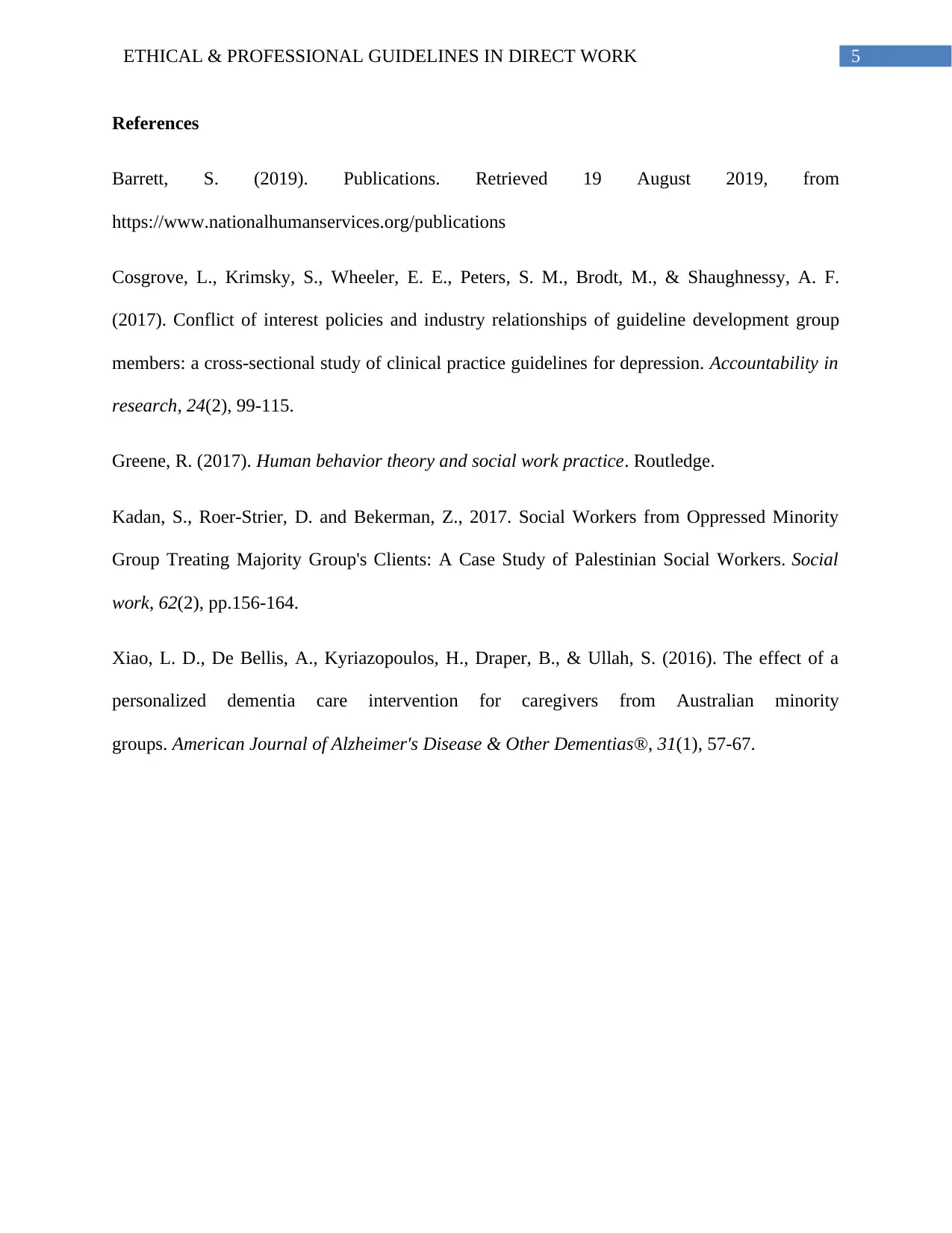
5ETHICAL & PROFESSIONAL GUIDELINES IN DIRECT WORK
References
Barrett, S. (2019). Publications. Retrieved 19 August 2019, from
https://www.nationalhumanservices.org/publications
Cosgrove, L., Krimsky, S., Wheeler, E. E., Peters, S. M., Brodt, M., & Shaughnessy, A. F.
(2017). Conflict of interest policies and industry relationships of guideline development group
members: a cross-sectional study of clinical practice guidelines for depression. Accountability in
research, 24(2), 99-115.
Greene, R. (2017). Human behavior theory and social work practice. Routledge.
Kadan, S., Roer-Strier, D. and Bekerman, Z., 2017. Social Workers from Oppressed Minority
Group Treating Majority Group's Clients: A Case Study of Palestinian Social Workers. Social
work, 62(2), pp.156-164.
Xiao, L. D., De Bellis, A., Kyriazopoulos, H., Draper, B., & Ullah, S. (2016). The effect of a
personalized dementia care intervention for caregivers from Australian minority
groups. American Journal of Alzheimer's Disease & Other Dementias®, 31(1), 57-67.
References
Barrett, S. (2019). Publications. Retrieved 19 August 2019, from
https://www.nationalhumanservices.org/publications
Cosgrove, L., Krimsky, S., Wheeler, E. E., Peters, S. M., Brodt, M., & Shaughnessy, A. F.
(2017). Conflict of interest policies and industry relationships of guideline development group
members: a cross-sectional study of clinical practice guidelines for depression. Accountability in
research, 24(2), 99-115.
Greene, R. (2017). Human behavior theory and social work practice. Routledge.
Kadan, S., Roer-Strier, D. and Bekerman, Z., 2017. Social Workers from Oppressed Minority
Group Treating Majority Group's Clients: A Case Study of Palestinian Social Workers. Social
work, 62(2), pp.156-164.
Xiao, L. D., De Bellis, A., Kyriazopoulos, H., Draper, B., & Ullah, S. (2016). The effect of a
personalized dementia care intervention for caregivers from Australian minority
groups. American Journal of Alzheimer's Disease & Other Dementias®, 31(1), 57-67.
⊘ This is a preview!⊘
Do you want full access?
Subscribe today to unlock all pages.

Trusted by 1+ million students worldwide
1 out of 6
Related Documents
Your All-in-One AI-Powered Toolkit for Academic Success.
+13062052269
info@desklib.com
Available 24*7 on WhatsApp / Email
![[object Object]](/_next/static/media/star-bottom.7253800d.svg)
Unlock your academic potential
Copyright © 2020–2026 A2Z Services. All Rights Reserved. Developed and managed by ZUCOL.





